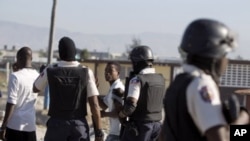The Office of the U.N. High Commissioner for Human Rights is calling for an urgent investigation into allegations of police torture and killings in Haiti. Two U.N. reports appear to implicate Haitian national police officers in the unlawful deaths of nine people in the capital, Port-au-Prince, between October 2010 and June 2011.
The two U.N. reports detail investigations of six incidents in which approximately 20 Haitian national police officers are implicated in the deaths of nine Haitians.
Spokeswoman for the U.N. Human Rights Office Ravina Shamdasani tells VOA the investigators believe these deaths may have been the result of illegal use of force by the police. In some cases, she says, there are indications of extrajudicial or summary and arbitrary executions.
Despite the evidence, she says action taken by the government or judiciary to prosecute these cases is, at best, lackluster.
"There have been some steps taken to initiate investigations and a couple of officers are pending trial," said Shamdasani. "But there have been no convictions to date. In fact, some of the police personnel who were responsible allegedly for these violations have resumed their functions even before the end of the investigation. This is obviously not the right way to conduct law enforcement and it is not the right way to build public confidence in the work of the Haitian police."
Shamdasani says the police do not appear to be targeting specific groups of people, that there is no pattern to the killings.
One case, she says, involves thieves. In another, a person got into trouble for displaying an opposition candidate's campaign posters, indicating a possible political motive. And in yet another, she says, torture was used to elicit a confession out of a murder suspect.
The U.N. spokeswoman says the police often blame their lack of resources for such abusive practices. While this may be true, she says it is a flimsy excuse and these unlawful excesses only serve to inspire fear in the public.
"We are concerned that it is creating a climate where Haitian people do not trust their police," added Shamdasani. "In many cases, we have seen that witnesses are afraid of the consequences of giving testimony because they are convinced that justice will not be rendered and they are worried about reprisals. So it is the very people who are supposed to be protecting Haitian citizens [who] are being feared, because people do not trust them."
It is for this reason, Shamdasani says, that the United Nations decided to go public with these reports, and to share them with the Haitian government and the police.
She says Haiti's president saw the reports and was not happy with the findings. He acknowledged some of the problems that were highlighted, she added, and expressed a willingness to work with the United Nations to try to resolve the problems.




